|
|
|
Sort Order |
|
|
|
Items / Page
|
|
|
|
|
|
|
| Srl | Item |
| 1 |
ID:
118440
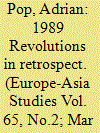

|
|
|
|
|
| Publication |
2013.
|
| Summary/Abstract |
Reminding us of the failure of academia to predict the East European revolutions, and the challenges presented by the latter to the theories of revolution, the essay claims that in order to understand why the exit from communism comprised so many varied modes, one should take a 'path-dependence' diachronic and synchronic comparative perspective. Based on this dual approach and a set of variables, the essay advances a typology of East European revolutions and argues that the issues regarding the type of political regime, the development of civil society and its way of interacting with the state are of paramount importance for comprehending how the 'negotiated revolutions' in Central Europe came about. Finally, the significance of the Central European civil society strategy under late communism for the era of globalisation is addressed.
|
|
|
|
|
|
|
|
|
|
|
|
|
|
|
|
| 2 |
ID:
129477
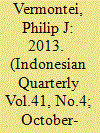

|
|
|
|
|
| Publication |
2013.
|
| Summary/Abstract |
The year 2013 has been seen as a prelude to the so-called political year of 2014. One of the weirdest political scenes in 2013 was when political parties had to advertise in the media in order to find people to
be listed as their candidates for the parliamentary election. Moreover, the parties had to rush in recruiting the candidates to meet deadlines for names submission set out by the Indonesian Election Commission KPU). This can be understood as a symptom of how dysfunctional our political parties are. Party recruitment and training program are indicators of whether or not a political party is well-functioning. A political party has to be ready with its recruitment process immediately after an election is done. It has to start all internal political process right away. By doing so, those who lost in the election will be able to quickly regroup while the winner consolidates. But what we saw in such an advertisement in the media simply reinforces the image
widely held by the public that politicians and /or political parties are just regular job seekers. Politicians are no longer thought of as noble individuals. Politics then become an arena which good people do not intend to enter.
|
|
|
|
|
|
|
|
|
|
|
|
|
|
|
|
| 3 |
ID:
128133


|
|
|
|
|
| Publication |
2013.
|
| Summary/Abstract |
On June 18 as Afghan president Hamid Karzai and the high peace council prepared to start talks independently with the Taliban in Doha, Emirate of Qatar, the United States after playing hide and seek and holding undisclosed intermittent talks in Doha for more than a year announced that it will be opening direct talks with Taliban leaders within days. At the time of writing, these talks have not begun, but a US delegation has arrived in Doha and they expect to begin talking soon
|
|
|
|
|
|
|
|
|
|
|
|
|
|
|
|
| 4 |
ID:
128389
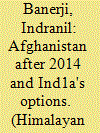

|
|
|
|
|
| Publication |
2011.
|
| Summary/Abstract |
Current speculation on the future of Afghanistan revolves around 2014, the year US forces are supposed to finally end their Afghan War mission. The key question is what will happen once the Americans depart? What sort of Afghanistan would emerge after that? Would the Taliban once again overrun that country and establish a ruthless Islamic emirate? Or would the pro-West regime in Kabul survive with the aid of the fledgling Afghan National Army and police? And where would all that leave India?
|
|
|
|
|
|
|
|
|
|
|
|
|
|
|
|
| 5 |
ID:
128387
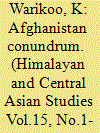

|
|
|
|
|
| Publication |
2011.
|
| Summary/Abstract |
Located at the crossroads of Central, South and West Asia and sharing. its borders with Central Asian Republics of Tajikistan, Uzbekistan and Turkmenistan on the north, Chinese province of Xinjiang in the east, [ran on the west and south west, and Pakistan and Pak-occu pied Kashmir on the south and south east, Afghanistan occupies a unique geo-strategic placement in the region. Distinct ethno-linguistic groups settled in different parts of .»'\fghanistan have diverse social moorings and political affiliations and aspirations. Th us the 'I'ajil
|
|
|
|
|
|
|
|
|
|
|
|
|
|
|
|
| 6 |
ID:
128430
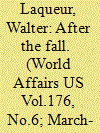

|
|
|
|
|
| Publication |
2014.
|
| Summary/Abstract |
As the Soviet Union disintegrated, ending on the ash heap of history in 1989-91, all the institutes for the study of Marxism-Leninism that had justified the regime, the collected and selected works of the communist classics, and the Marxism chairs in academies and universities also disappeared. From this void emerged a burning question: What was the raison d'être of the existing political system? And later, how did the new regime justify itself in the field of foreign and domestic affairs, and what was its social and economic policy? For the answers, Vladimir Putin and his followers went back to the future. Russia's official ideology prior to 1917 was Pravoslavie, Samoderzhavie,Narodnost, which has been translated as Orthodoxy, Autocracy, Nationality. This statement was made first by Sergei Uvarov, the Russian minister of education, in a circular letter in 1833. Uvarov was a learned man who also served as president of the Russian Academy of Sciences. No one had asked Uvarov to prepare such an official binding declaration. However, Czar Nicholas I liked this "triad," as it was called, even though its meaning was by no means always clear.
|
|
|
|
|
|
|
|
|
|
|
|
|
|
|
|
| 7 |
ID:
161048
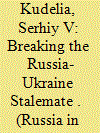

|
|
|
|
|
| Summary/Abstract |
This paper examines Russian-Ukrainian relations of the past four years in the context of the present political regime in Ukraine and the interests of its ruling elite. It focuses on the fundamental changes in the Ukrainian leadership’s foreign policy strategy and points to long-term risks associated with Kiev’s hopes that Western patronage will help strengthen its security. In conclusion, the author considers three scenarios for the development of the Ukrainian state in the coming decade and analyzes their possible consequences for Russian-Ukrainian relations.
|
|
|
|
|
|
|
|
|
|
|
|
|
|
|
|
| 8 |
ID:
129261
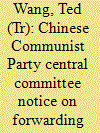

|
|
|
|
|
| Publication |
2012.
|
| Summary/Abstract |
To the Xinjiang Autonomous Region Party Committee and the party committees of all provinces, municipalities, and autonomous regions; the party committees of all large military districts, provincial military districts, and field armies; all central ministries and commissions; the party committees of various ministries and commissions of state organs; all general headquarters of military commissions; the party committees of all services of the armed forces; and the party committees of all people'sorganizations:The "Central Secretariat Summary of Discussions on Work Issues inXinjiang"1is hereby issued to you. Please implement it and carry it out in connection with actual circumstances. This document is simultaneously issued to the Party committees of all provinces, municipalities, and autonomous regions for reference. On the morning of July 6, 1981, issues in the work in Xinjiang were once again discussed in accordance with the Resolutions on a Number of Historical Questions in the Party since the Founding of the People's Republic passed by the Sixth Plenary Session of the Eleventh Party
|
|
|
|
|
|
|
|
|
|
|
|
|
|
|
|
| 9 |
ID:
128946
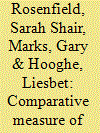

|
|
|
|
|
| Publication |
2014.
|
| Summary/Abstract |
In this article we set out a fine-grained measure of the formal authority of intermediate subnational government for Indonesia, Malaysia, the Philippines, South Korea, and Thailand that is designed to be a flexible tool in the hands of researchers and policymakers. It improves on prior measures by providing annual estimates across ten dimensions of regional authority; it disaggregates to the level of the individual region; and it examines individual regional tiers, asymmetric regions, and regions with special arrangements. We use the measure and its elements to summarize six decades of regional governance in Southeast Asia and conclude by noting how the Regional Authority index could further the dialogue between theory and empirics in the study of decentralization and democratization.
|
|
|
|
|
|
|
|
|
|
|
|
|
|
|
|
| 10 |
ID:
084159
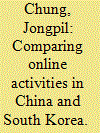

|
|
|
| 11 |
ID:
127769
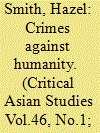

|
|
|
|
|
| Publication |
2014.
|
| Summary/Abstract |
The United Nations Human Rights Council (UNHRC) Commission of Inquiry, established in 2013 to investigate human rights violations in North Korea, identified food rights violations, among other abuses, as potentially constituting crimes against humanity. A contradiction arises in that UNHRC claims of food rights violations in the DPRK are not congruent with the statistical indicators emanating from the UN humanitarian and development agencies that have worked in the DPRK since the mid 1990s and that have engaged in and published substantial research on food, nutrition, and health. The author of this article contends that North Korea has an oppressive government and argues that the lack of transparency makes the many things that are unknown about North Korea, especially its opaque penal system, of legitimate ethical and political concern. Reasonably good data on issues pertaining to social and economic rights do exist, however, as this article shows. The inconsistency between the received wisdom on food and nutrition is of concern because the potential consequences of a state being judged as committing crimes against humanity include military intervention and consequent threats to life for millions. This article reconsiders how and why the received wisdom becomes unchallenged and unchallengeable in scholarly, policy, and media discourse. Inconsistency and misrepresentation is not primarily due to conscious bias but much more because of the unconscious adoption of a securitized perspective through which knowledge about North Korea is filtered. The article argues for reframing North Korean human rights issues on the basis that North Korean society is neither unique nor unknowable.
|
|
|
|
|
|
|
|
|
|
|
|
|
|
|
|
| 12 |
ID:
130445
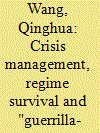

|
|
|
|
|
| Publication |
2014.
|
| Summary/Abstract |
Based on newly available memoirs and previously unexplored policy speeches by insiders, this article conducts a political analysis of the Chinese Communist Party's decision to radically expand college enrollment in June 1999. I argue that the decision exemplifies a "guerrilla-style approach" to policy-making. From late March to early June of 1999 when the radical expansion policy was formulated and legitimated, the top leadership ignored opposition from the Ministry of Education (MOE), overturned established policies and assumed de facto control over MOE bureaucratic power. This abrupt, forceful, disruptive and non-professional policy intervention, which aimed to ensure regime survival in the wake of the Asian financial crisis, was antithetical to regularized educational policy-making in post-Mao China.
|
|
|
|
|
|
|
|
|
|
|
|
|
|
|
|
| 13 |
ID:
125100
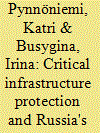

|
|
|
|
|
| Publication |
2013.
|
| Summary/Abstract |
The Russian policy on critical infrastructure protection was outlined in the early 2000s and has been consolidated in recent years as a part of the national security strategy. This policy is evolving against a background composed of an uneasy combination of factors: the degeneration of infrastructures critical for the country's economic and social development, and the de-legitimization of political institutions responsible for protecting 'population' and 'territory'. The recent major catastrophes in Russia, the notorious forest fires in 2010 in particular, have become examples of political events that offer a point of reference for the current regime's failure to uphold its promises of 'order and stability'.
|
|
|
|
|
|
|
|
|
|
|
|
|
|
|
|
| 14 |
ID:
127820
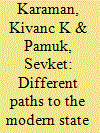

|
|
|
|
|
| Publication |
2013.
|
| Summary/Abstract |
Theoretical work on taxation and state-building borrows heavily from early modern European experience. While a number of European states increased centralized tax revenues during this period, for others revenues stagnated or even declined and these variations have motivated alternative arguments for the determinants of fiscal and state capacity. This study reviews the arguments concerning the three determinants that have received most attention, namely warfare, economic structure, and political regime, and tests them by making use of a new and comprehensive tax revenue dataset. Our main finding is that these three determinants worked in interaction with each other. Specifically, when under pressure of war, it was representative regimes in more urbanized-commercial economies and authoritarian regimes in more rural-agrarian economies that tended to better aggregate domestic interests towards state-building.
|
|
|
|
|
|
|
|
|
|
|
|
|
|
|
|
| 15 |
ID:
128220
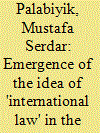

|
|
|
|
|
| Publication |
2014.
|
| Summary/Abstract |
The literature on the Ottoman Empire's position in the European states system generally considers the Treaty of Paris as a landmark event for the European states' recognition of the Ottoman participation in the European concert and the advantages of European international law. This article argues that this consideration overestimates the impact of the Treaty of Paris and reveals that before 1856, the Ottoman Empire was a part of the European states system and was subject to European international law both in terms of treaty-making practices and in the utilization of European customary law. Moreover, the article argues that the Ottomans were interested in the concept of international law before the Treaty of Paris. The existence of archival documents on Ottoman dealings with the European states and the publication of two translations from the European international law treatises before the Treaty of Paris indicate that the Ottomans interest in international law was to ensure the survival of the empire.
|
|
|
|
|
|
|
|
|
|
|
|
|
|
|
|
| 16 |
ID:
128856
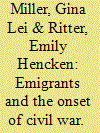

|
|
|
|
|
| Publication |
2014.
|
| Summary/Abstract |
We propose that emigrants affect the likelihood of civil war onset in their state of origin by influencing the willingness of individuals to join rebel movements and the probability that the state and rebels will be unable to reach a mutually acceptable bargain to avoid conflict in three ways. First, migrants communicating with actors at home facilitate valid comparisons between the effects of policies in the home state as compared to policies in the host state enacted on a similar group, creating new motivation to join collective challenges against the state. Second, migrants send remittances, providing resources that can be used in collective challenges that are particularly difficult for states to anticipate, making the outbreak of conflict more likely. Finally, migrants publicize information about conditions in their home state while living in the host state, reducing home government uncertainty such that conflict is less likely to occur. We test these hypotheses on an international dataset and find support for each of our predicted mechanisms.
|
|
|
|
|
|
|
|
|
|
|
|
|
|
|
|
| 17 |
ID:
128266
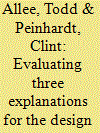

|
|
|
|
|
| Publication |
2014.
|
| Summary/Abstract |
Although many features of bilateral investment treaties (BITs) are consistent from one agreement to the next, a closer look reveals that the treaties exhibit considerable variation in terms of their enforcement provisions, which legal scholars have singled out as the central component of the treaties. An original data set is compiled that captures three important treaty-design differences: whether the parties consent in advance to international arbitration, whether they allow treaty obligations to be enforced before an institutionalized arbitration body, and how many arbitration options are specified for enforcement. Drawing upon several relevant literatures on international institutions, three potentially generalizable explanations for this important treaty variation are articulated and tested. The strongest support is found for the theoretical perspective that emphasizes the bargaining power and preferences of capital-exporting states, which use the treaties to codify strong, credible investor protections in all their treaties. Empirical tests consistently reveal that treaties contain strong enforcement provisions-in which the parties preconsent to multiple, often institutionalized arbitration options-when the capital-exporting treaty partner has considerable bargaining power and contains domestic actors that prefer such arrangements, such as large multinational corporations or right-wing governments. In contrast, there is no evidence to support the popular hands-tying explanation, which predicts that investment-seeking states with the most severe credibility problems, due to poor reputations or weak domestic institutions, will bind themselves to treaties with stronger investment protections. likewise, little support is found for explanations derived from the project on the rational design of international institutions, which discounts the identities and preferences of the treaty partners and instead emphasizes the structural conditions they jointly face. In sum, this foundational study of differences across investment treaties suggests that the design of treaties is driven by powerful states, which include elements in the treaties that serve their interests, regardless of the treaty partner or the current strategic setting.
|
|
|
|
|
|
|
|
|
|
|
|
|
|
|
|
| 18 |
ID:
120122
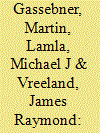

|
|
|
|
|
| Publication |
2013.
|
| Summary/Abstract |
What determines the emergence and survival of democracy? The authors apply extreme bounds analysis to test the robustness of fifty-nine factors proposed in the literature, evaluating over three million regressions with data from 165 countries from 1976 to 2002. The most robust determinants of the transition to democracy are gross domestic product (GDP) growth (a negative effect), past transitions (a positive effect), and Organisation for Economic Co-operation and Development membership (a positive effect). There is some evidence that fuel exporters and Muslim countries are less likely to see democracy emerge, although the latter finding is driven entirely by oil-producing Muslim countries. Regarding the survival of democracy, the most robust determinants are GDP per capita (a positive effect) and past transitions (a negative effect). There is some evidence that having a former military leader as the chief executive has a negative effect, while having other democracies as neighbors has a reinforcing effect.
|
|
|
|
|
|
|
|
|
|
|
|
|
|
|
|
| 19 |
ID:
129263
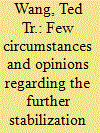

|
|
|
|
|
| Publication |
2012.
|
| Summary/Abstract |
Speech made by Comrade Jiang Zemin at a symposium held during the Sixth Plenary Meeting of the Thirteenth Chinese Party Congress. Today we invite comrades from ethnic border regions and from the Shenyang, Beijing, Lanzhou, and Chengdu military districts who are participating in the present central (committee) plenary meeting to attend a symposium, and we also invite comrades from the various de- partments of the Party Center and the relevant state council departments participating in the plenary meeting to attend in order to study the matter of further stabilizing the ethnic border regions. This indicates that the Party Center, the state council, and the Central Military Commission show great concern for and attach importance to the work in the ethnic border regions
|
|
|
|
|
|
|
|
|
|
|
|
|
|
|
|
| 20 |
ID:
128860
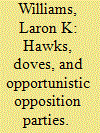

|
|
|
|
|
| Publication |
2014.
|
| Summary/Abstract |
Parliamentary regimes offer the unique opportunity for opposition parties to react to foreign policy by proposing no-confidence motions (NCMs). The threat of an NCM bringing down the government may be enough to induce pacific behavior by the executive. Yet, this simplistic characterization neglects the possible electoral motivations of opportunistic opposition parties. I develop a theory that opposition parties respond to involvement in international conflict by proposing NCMs as a tool to influence voters' opinions with an eye toward the next election. I develop two expectations based on policy disagreement and issue ownership that I use to explain the electorally motivated decision to propose NCMs following conflict. I test these expectations with a dataset of 14 European parliamentary democracies from 1970 to 2001. The empirical evidence suggests that the partisanship of both the government and opposition parties interact to create varying electoral incentives to propose NCMs based on issue ownership. Right-wing opposition parties are more likely to challenge than left-wing parties, and this effect is exacerbated when facing left-wing governments. This study has important implications that underpin a number of theories of the domestic causes of international conflict as well as implications for the study of party strategy.
|
|
|
|
|
|
|
|
|
|
|
|
|
|
|
|
|
|
|
|
|